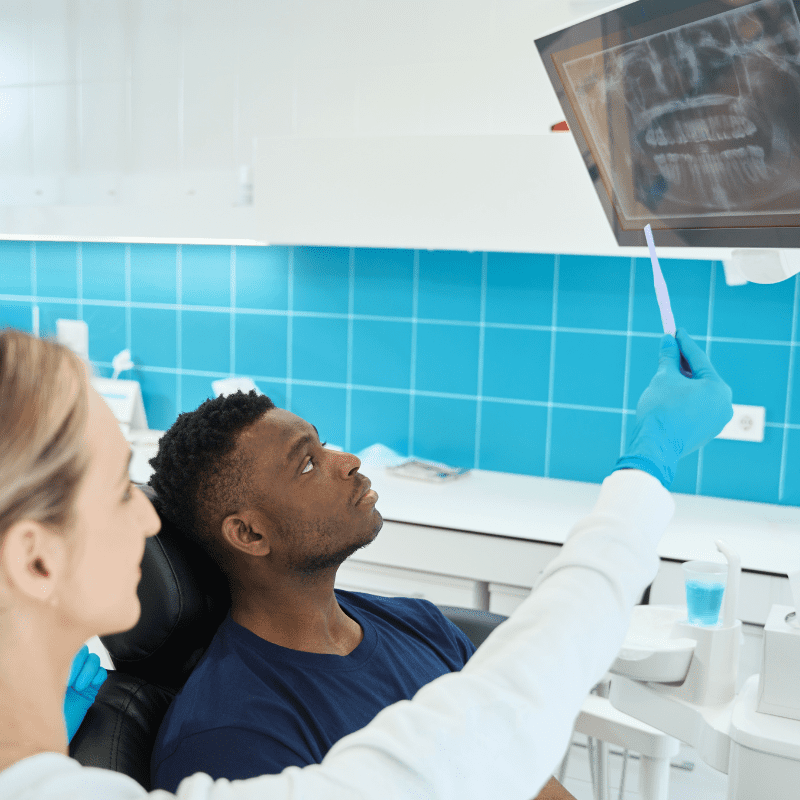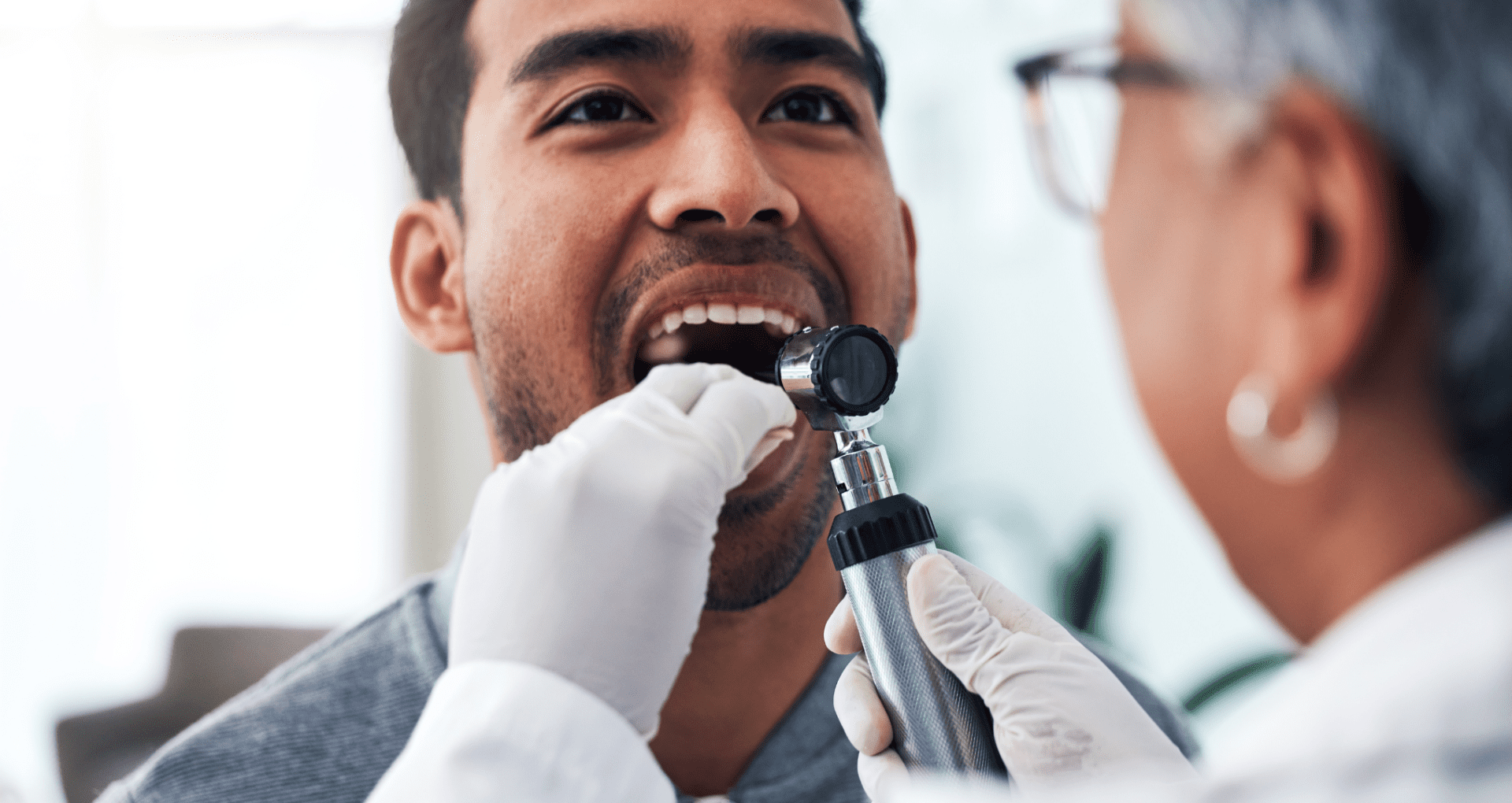Oral cancer is a potentially deadly disease affecting millions of people worldwide. It is essential that everyone is aware of the signs and symptoms of this condition so that they can detect it early and get the necessary treatment before it advances to a more severe stage. During every check-up and visit, you can expect your Advanced Indiana team to look for cancer markers. But there are things you can look for at home. So, let’s take a closer look at oral cancer, its symptoms, and how to prevent it.
What is Oral Cancer?
Oral cancer is characterized by the growth of malignant cells in the tissues of the mouth. These cells can develop in any part of the mouth, including the tongue, lips, gums, cheeks, roof of the mouth, and throat. The cancerous cells appear as red, white, or gray patches, sores that do not heal, or lumps or bumps in the mouth. In some cases, they may cause pain or bleeding. If you notice any of these signs, it is essential to go to a doctor immediately.

Less Common Signs of Oral Cancer
While the primary indicators of oral cancer are quite well-known, there are some less obvious signs that everyone should be aware of. Persistent earaches or difficulty swallowing may be indicative of oral cancer. Unexplained weight loss is another less recognized symptom, often overlooked as a general health concern rather than a potential sign of oral cancer. Occasionally, changes in how your teeth or dentures fit together could also point to this disease. Furthermore, numbness or loss of feeling in parts of the mouth can be a symptom. Unexplained hoarseness or changes in the voice may also be a red flag. It’s essential to remember that these symptoms can be caused by conditions other than cancer. However, if you experience any of these for an extended period, seeing a healthcare professional for a thorough examination is crucial.
What are the Risk Factors?
There are some common risk factors associated with oral cancer. The first is tobacco use, whether in the form of smoking, chewing, or snuffing. Excessive alcohol consumption is also a significant risk factor for developing oral cancer. People exposed to the human papillomavirus (HPV) are also at a higher risk of developing this type of cancer. Poor nutrition and neglecting dental hygiene can also contribute to the development of oral cancer.
How is Oral Cancer Detected?
Early detection is critical to ensure the effective treatment of oral cancer. Since this condition often goes unnoticed in its initial stages, it is essential to see your dentist regularly for checkups. We will be able to identify any irregularities in your mouth and refer you to a specialist if necessary. If you experience any pain, swelling, or other symptoms that persist for more than two weeks, you should consult a doctor.
How Are the Treatment Options?
Oral cancer treatment is determined by several factors, including the stage and location of the cancer, the patient’s general health, and personal preferences. Treatment options primarily involve surgery to remove the cancerous cells, followed by radiation therapy to kill any lingering cancerous cells. Chemotherapy, alone or combined with radiation therapy, is another treatment approach to destroy cancer cells. Targeted drug therapy, specifically targeting the abnormalities in cancer cells, is also an option. In some cases, immunotherapy might be used to stimulate your body’s immune system to fight the cancer. It’s important to discuss these options with your healthcare provider to understand their potential side effects and to make an informed decision about your treatment plan.
How Can I Prevent Oral Cancer?
Prevention is the best medicine when it comes to oral cancer. The most effective way to lower your risk of developing this type of cancer is to avoid tobacco and limit your consumption of alcohol. Eating a healthy diet rich in fruits and vegetables and getting enough exercise can also help reduce your risk of developing the disease. Regular visits to the dentist and maintaining good oral hygiene can also help you detect any changes in your mouth early and prevent the development of oral cancer.
What is Life Like After Having Oral Cancer?
Life after oral cancer can be a mixture of relief and new challenges. In the best-case scenarios, patients who have had early-stage oral cancer and received prompt treatment might resume their normal lives with minimal changes. They could have a near-normal diet, speech, and appearance, especially if the cancer was detected early and the required surgery was minimal. Regular follow-ups with a health care team are vital to monitor for any potential recurrence and to manage any long-term side effects of treatment.
On the other hand, in more severe cases where a significant portion of the mouth or throat is affected, patients might face additional challenges. They may have to adapt to significant lifestyle changes, including altered speech, difficulty eating, and changes in appearance due to surgery. In these situations, rehabilitation services, such as speech therapy or dietary counseling, can be beneficial. Psychological support may also be necessary to help cope with the emotional aftermath of the disease. Regardless, life after oral cancer is a testament to resilience and the human capacity to adapt and thrive in the face of adversity.
Talk to Us About Your Concerns
Oral cancer is a serious condition that can be life-threatening if not detected and treated early. Its symptoms can often be subtle and go unnoticed, so it is essential to be aware of the risk factors, signs, and prevention strategies associated with the disease. If you have a family history of the disease or start to notice anything odd about your dental health, speak up at your dental appointment. Our team will do a thorough examination and make further recommendations if needed. Want to talk to us about other dentistry options, such as dentures or tooth extraction? Schedule your appointment in our Indianapolis, Anderson, or Fortville, IN, office today!

